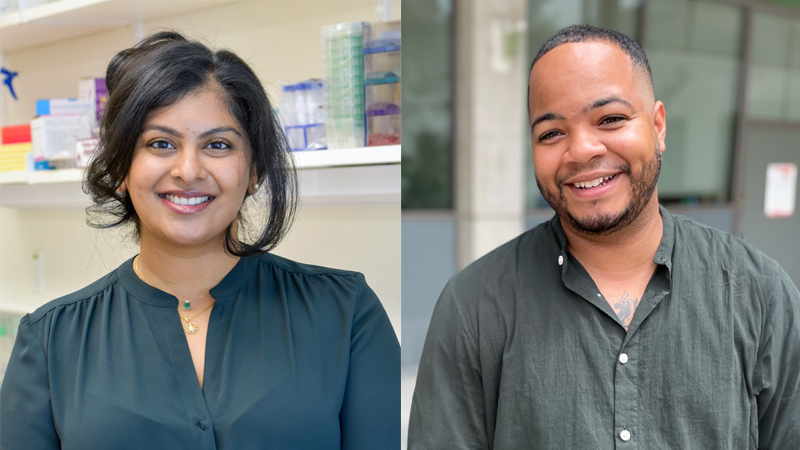
Two Scripps Research scientists completing postdoctoral studies have been awarded prestigious fellowships by the Jane Coffin Childs Memorial Fund for Medical Research.
Divya Bezwada, PhD, a postdoctoral associate working in the lab of Professor Benjamin Cravatt, and Donte Alexander (Alex) Stevens, PhD, a postdoc in the lab of Assistant Professor Keren Lasker, were named 2024 Jane Coffin Childs (JCC) Fellows on June 27, 2024, an honor that includes $223,800 of research funding over a three-year period.
“I am excited and honored to join the JCC community as a fellow,” says Bezwada. “Many prior JCC fellows have gone on to make impactful discoveries in their own independent laboratories, and I hope I will have the opportunity to do the same. I am particularly grateful to my mentor, Benjamin Cravatt, for his unwavering guidance and support.”
Bezwada studies a fundamental biochemical process in protein function called allostery, wherein an action or effect to one spot on a protein influences a different site of interest on the same protein. Allosteric sites on proteins hold great promise as a potential drug targets, but drug development strategies are hampered by the elusive nature of allosteric sites. Bezwada’s work aims to develop new chemical tools for understanding allosteric sites and potential therapeutic applications.
In the Lasker laboratory, Stevens is investigating a novel mode for treating tauopathies—neurodegenerative diseases like Alzheimer’s that are characterized by the aggregation of tau protein—involving the engineering of biomolecular condensates to remove tau aggregates in the brain. Stevens’ research will set the foundation for next generation tauopathy therapies and provide a general framework using biomolecular condensates to modulate pathological events.
“The Jane Coffin Childs Memorial Fund for Medical Research’s recognition of the value of my approach to developing therapeutic solutions for neurodegenerative diseases is an honor and incredibly motivating,” says Stevens. “I am excited to build connections with the JCC community and look forward to sharing ideas and collaborating with this group of outstanding scientists.”
After completing their postdoctoral research as a JCC fellow, both Stevens and Bezwada have ambitious plans for the future of their research.
“I hope to be leading my own laboratory as a tenure track professor sometime in the future,” says Bezwada. “I want to combine my biology background with the chemical biology expertise of the Cravatt lab to make discoveries that impact human health in my laboratory. The funding from JCC will allow me the freedom to explore new ideas and hone the focus of my scientific career.”
Stevens, meanwhile, looks forward to running his own research group focused on investigating how the cytoskeleton and biomolecular condensates interact, cooperate and co-regulate each other to generate and maintain spatial organization within cells.
“My future research goal is to address critical questions around how membrane-less organelles play a critical role in orchestrating cellular functions,” says Stevens. “By elucidating the regulatory mechanisms at the interface of these systems, my future lab would advance fundamental cell biology and provide new insights into disease mechanisms, opening new avenues for therapeutic intervention.”
The Jane Coffin Childs Memorial Fund for Medical Research was established by the Childs Family in 1937 to honor the memory of Jane Coffin Childs. Inspired by the founding purpose to support research into the causes and treatment of cancer, the Fund’s mission has broadened to support fundamental scientific research that advances our understanding of the causes, treatments, and cures for human disease. More information about the fund and the fellows it supports can be found on the website https://www.jccfund.org/.